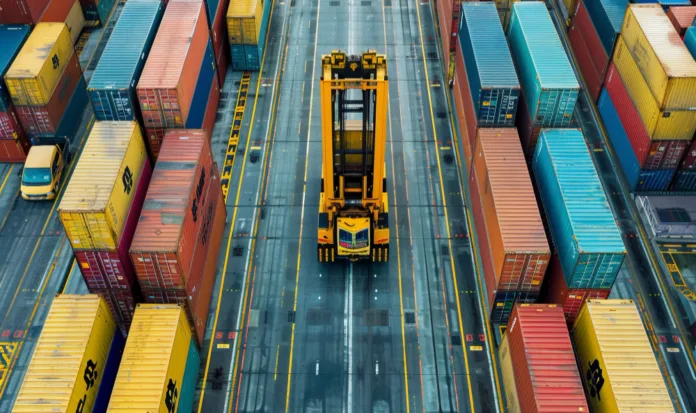A major investment aims to modernise transport systems, with SR200 billion already deployed as Saudi Arabia accelerates its logistics transformation under Vision 2030
Saudi Arabia has unveiled a groundbreaking plan to invest over SR1 trillion ($267 billion) into its logistics sector by 2030, marking a significant step towards becoming a global logistics hub. The announcement came during the Global Logistics Forum 2024, which kicked off in Riyadh on October 13 and underscores the Kingdom’s ambitious Vision 2030 initiative, aimed at economic diversification and establishing the nation as a leader in international trade and transport.
The forum, a two-day event held at the King Abdullah Financial District, attracted global leaders and industry stakeholders to discuss the future of logistics, international collaboration, and the role of cutting-edge technology in modernising supply chains. The Minister of Transport and Logistics Services, Saleh bin Nasser Al-Jasser, made the headline announcement during his keynote speech, detailing the Kingdom’s progress in the sector and its plans for the future.
“Saudi Arabia has already invested SR200 billion in its logistics infrastructure,” Al-Jasser stated, “and this has led to significant advancements, including a 17-rank jump in the World Bank’s Logistics Performance Index and a 14-rank improvement in the International Air Transport Association’s Global Connectivity Index.”
Embed from Getty ImagesThese achievements have bolstered the Kingdom’s standing in the global logistics market, but this is only the beginning. The investment is part of a broader strategy initiated by Crown Prince Mohammed bin Salman to strengthen Saudi Arabia’s role as a bridge between three continents—Asia, Europe, and Africa. With its central geographical location, the Kingdom aims to establish itself as a crucial node in global supply chains, capable of reaching more than 40 per cent of the world’s gross domestic product (GDP) within a six-hour flight.
Al-Jasser highlighted that the world’s logistics industry is at a pivotal moment. Disruptions in global supply chains, driven by geopolitical tensions and economic instability, have exposed vulnerabilities. The time is ripe, he said, to address these challenges and shape a future that ensures both efficiency and sustainability. “There is no better time for Saudi Arabia to take the lead in reshaping the global logistics landscape,” he remarked, adding that the Kingdom’s vision goes beyond infrastructure, encompassing advanced technologies like artificial intelligence, blockchain, and smart logistics networks.
The event wasn’t just a platform for speeches. Several high-profile agreements were signed, reinforcing Saudi Arabia’s commitment to international partnerships. Among them was a maritime connectivity agreement between the Kingdom’s Transport General Authority and Egypt’s Ministry of Transport, aimed at boosting trade between the two nations. In another significant deal, King Salman International Airport Development Co. signed a memorandum of understanding with partners, an independent investment firm, to collaborate on the KSA-Sino Logistics Zone.
King Abdullah Port also sealed a deal with Mediterranean Shipping Co. to establish a temperature-controlled warehouse at the port, enhancing the Kingdom’s capacity to handle perishable goods and sensitive cargo. These agreements reflect the Kingdom’s ambition to become a major player in global supply chains by fostering collaboration and innovation across the logistics ecosystem.
One of the most noteworthy developments announced at the forum was the expansion of Agility Logistics Parks in Riyadh. The final phase of this SR250 million project will add 100,000 square metres of Class A warehousing, bringing the total space to over half a million square metres. This expansion is expected to create 300 new jobs and attract global firms to establish a presence in Saudi Arabia. Agility is also investing SR611 million to build a third logistics complex near Jeddah, further strengthening the Kingdom’s infrastructure.
“By building world-class warehousing, we are not only increasing capacity but also enhancing Saudi Arabia’s standing as a global logistics hub,” said Michel Saab, Global CEO of Agility Logistics Parks. He emphasised that Saudi Arabia’s logistics market is rapidly evolving and that projects like these will help attract multinational companies looking to expand their operations in the Middle East.
As the Kingdom positions itself as a leader in sustainable logistics, environmental considerations are playing an increasingly prominent role in its strategy. Al-Jasser highlighted the Saudi Green Initiative, noting that last year alone, the country’s rail network eliminated the need for one million truck journeys, significantly reducing carbon emissions. This focus on sustainability is part of a broader effort to align Saudi Arabia’s economic goals with its environmental responsibilities.
Al-Jasser emphasised that the logistics sector is being transformed by technology, with innovations such as AI, blockchain, and smart infrastructure helping to streamline supply chains, cut costs, and protect the environment. These advancements are key to Saudi Arabia’s long-term vision for the industry, making it not only more efficient but also more resilient to the challenges posed by climate change and global trade disruptions.
To further solidify its position as a logistics powerhouse, Saudi Arabia is also investing heavily in education and workforce development. The Ministry of Human Resources and Social Development, in collaboration with the Saudi Logistics Academy, has launched an initiative to train 7,800 individuals in various transport and logistics services. The academy will offer 60 different training programmes, from diplomas to specialised certifications, aimed at equipping Saudi citizens with the skills needed to thrive in the evolving logistics sector.
The Global Logistics Forum concluded with a resounding message of optimism and ambition. As the world grapples with complex supply chain challenges, Saudi Arabia is positioning itself at the heart of global commerce, using its investments and strategic partnerships to drive the future of logistics. The Kingdom’s vision is clear: by 2030, Saudi Arabia will not just be a crossroads for trade—it will be a global logistics hub, connecting continents, industries, and people.
